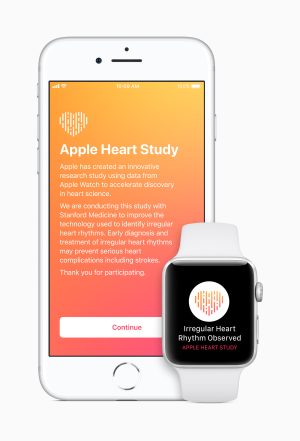
(credit: Apple)
The study was led by researchers at Stanford, who presented the results Saturday in New Orleans at the annual meeting of the American College of Cardiology. The results have not been published in a scientific journal and have not been peer-reviewed.
The study, dubbed the Apple Heart Study, began in November 2017, before the release of the Apple Watch Series 4, which includes an electrocardiograph (ECG) feature for monitoring heart activity. Though the study didn’t keep pace with that of wearable device development, it was rather speedy relative to clinical trials. In fact, some cardiologists were impressed simply by the short period of time in which the study was able to recruit such a large number of participants—nearly 420,000—plus follow up with them using telemedicine and get results.
Read 9 remaining paragraphs | Comments
https://ift.tt/2TTiPsz
Comments
Post a Comment